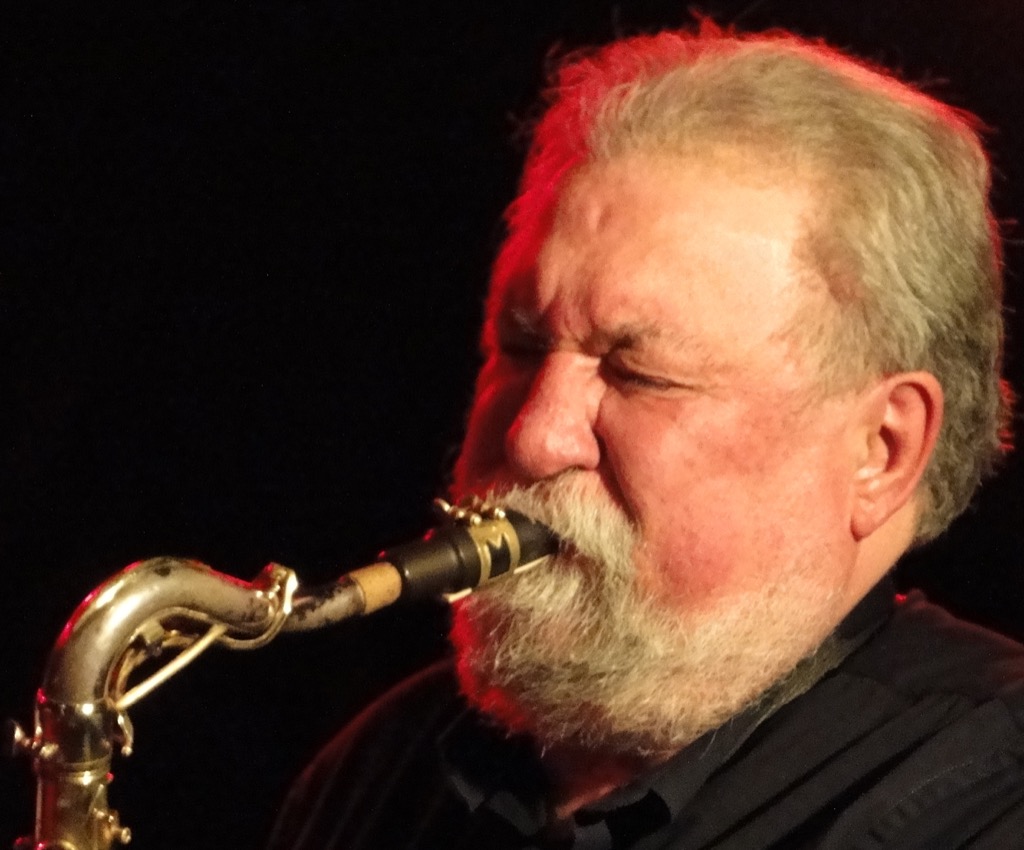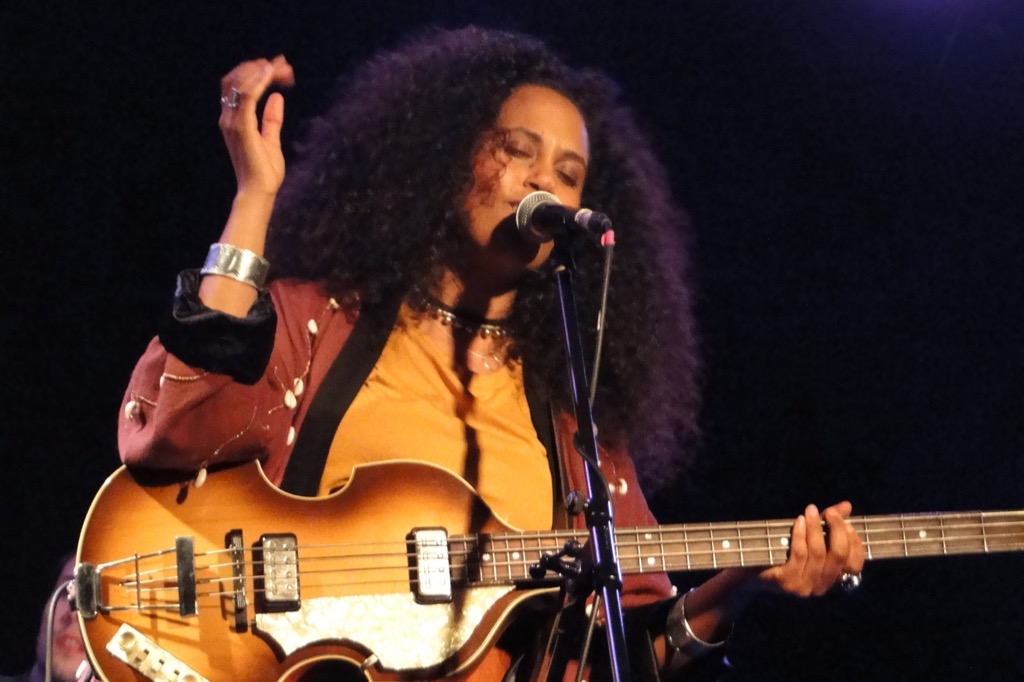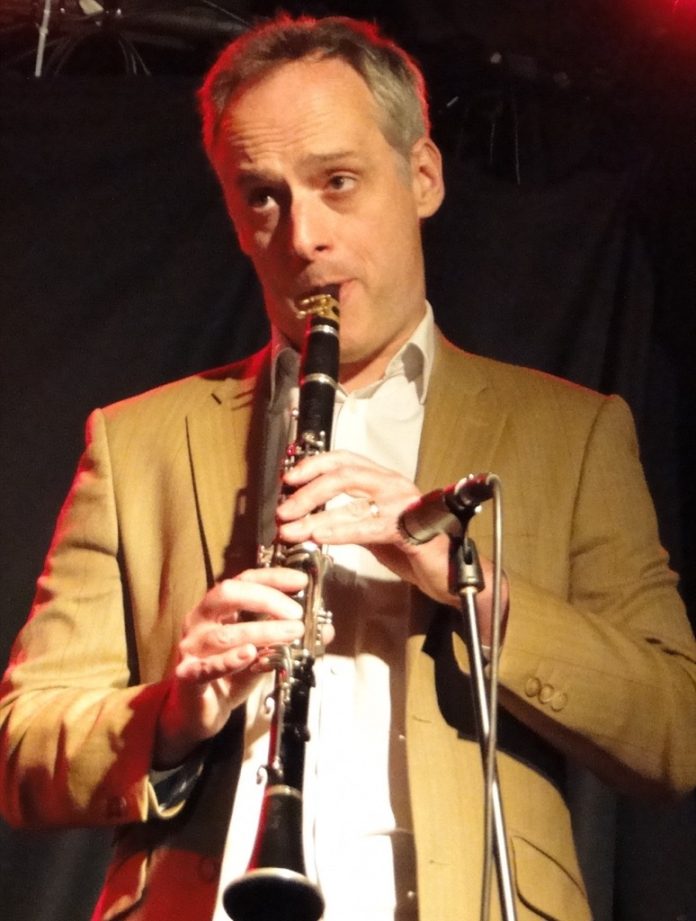The musicianship was exemplary, the soloing was eloquent and the compositions were striking. But what perhaps delighted most in Dinosaur’s performance was the ensemble playing. The sensitivity of the four musicians’ responses to each other and their ability to, as one, change the music tonally, harmonically and rhythmically were spellbinding. The quartet almost exclusively played music from their upcoming album. Much of this, including the title track To The Earth, was edgy and unsettling, even at moments unnerving. Laura Jurd’s trumpet playing was often lyrical and always lucid, as on the gorgeously melodic Swimming. On Billy Strayhorn’s Absinthe her mute technique was exceptional, the interpretation also distinguished by a delicate keyboard solo by Elliot Galvin. Jurd noted that the band was now in its 10th year, adding excitedly that this performance was “one of our gigs of the decade”. Many in the hugely enthusiastic audience, I suspect, would agree it was theirs too.
The set by Evan Parker (s), Alan Niblock (b) and Mark Sanders (d) comprised two long, untitled free improvisations. The communication between the musicians was astonishingly empathic and the use of advanced techniques was virtuosic, with Parker’s circular breathing, for example, being greeted with amazed gasps and ecstatic cheers. The improvisations in fact were surprisingly accessible for the music was very soulful and often beautiful. At one point a rogue fire alarm went off. To widespread delight Parker, as his distracted colleagues fell silent, began duetting with the alarm and, with Niblock and Sanders refocused, the collective improvisation took off again, in a new direction.
Italian pianist Francesco Turrisi’s remarkable eclecticism was apparent in his solo performance. Two tunes which he played as a medley, the introspective, elegant Mi Mariposa and Toccata Cromatica, were influenced by 17th century Italian religious music; Taksim, which was performed flamboyantly, alluded to Arabic music; a sombre, at times ominous-sounding tune utilised a traditional Italian folk melody; and so on. Elsewhere, On The Fourteenth Day was played with bracing assertiveness and the elegiac A Thousand Tears Old was affecting.

There was something refreshing about the unselfconscious eclecticism of the Brooklyn-based multi-national quartet Wood River, who were fronted by Charlotte Greve (v, s, elec). Their performance incorporated elements of jazz, rock, trance, prog, art-pop, minimalism and other styles of music. This clearly is a band simply uninterested in categorisation. Future Fun, for one, featured ethereal vocals, a poppy guitar motif, a hard-rock section and moments which, cor the blimeys, reminded me of 60s psych-electronic left-fielders The United States Of America. Spring was as joyous and as catchy as a classic pop song while, contrastingly, Shifter was fiercely intense and featured an extraordinarily distorted and discordant slide-guitar solo from Keisuke Matsuno, who created a noise so fearsome that a few pale-faced punters were seen fleeing the venue in horror.
In a programme that largely comprised 1920s and 1930s New Orleans music, The Dime Notes – David Horniblow (cl), Andrew Oliver (p), Dave Kelbie (g) and Louis Thomas (b) – played masterfully and, mercifully, without the irritating razzamatazz of so many revivalist bands. Included were several Jelly Roll Morton compositions, including Pep and Fickle Fay Creep, as well as material by more obscure artists such as J. Russel Robinson and Jack Pettis, all played lovingly and with verve and personality.
Bop-influenced trumpeter Linley Hamilton, a local hero, launched his CD For The Record with a band comprising American A-listers Mark Egan (b) and Adam Nussbaum (d) and top Irish musicians Derek O’Connor (ts) and Cian Boylan (p). Impressively, this felt like a real band rather than a bunch of hired hands simply convening for a random project. The musicians were clearly supportive of each other and collaborating with openness and generosity. The repertoire was almost entirely composed by various band members, including the uplifting Holly’s Moment. Hamilton, a master of melody, played with compelling tenderness on the Beatles’ And I Love Her while O’Connor’s passionate saxophone playing provided many of the evening’s highlights. Guest Dana Masters, Van Morrison’s backing vocalist, sang sublimely on Abbey Lincoln’s Throw It Away.
Dylan Rynhart’s compositions for quirkily original Irish quintet Fuzzy Logic were, apparently, inspired by the rhythms and intonation of speech. The melodies were certainly unusual and often rather angular. Sue Rynhart vocalised wordlessly, for the most part, at times singing with great purity, at other times variously screaming, shrieking, sobbing, sighing, clucking, tutting, ululating, growling and roaring. The music effectively interspersed dreamy passages with contrasting passages of aggressive free improv.
When The Dust Settles, an 11-piece, consisted of drummer-composer Steve Davis, from Bourne Davis Kane, a few other experienced players and a bunch of promising youngsters who played and improvised creatively on some interesting, challenging compositions.

London-based quintet Hejira performed material that lyrically, musically and through samples of sounds recorded in the country evoked Ethiopia, the homeland of singer Rahel Debebe-Dessalegne’s late father. Most of the music was very downbeat but the audience remained rapt throughout.
Kenosha Kid, from Athens, Georgia, played at rock-band volume and had the classic rock line-up of two electric guitars, electric bass and drums. The songs, while featuring improvisation, were typically short and succinct, the emphasis on atmospheric ensemble playing rather than virtuosic soloing. Simpler was melodically attractive while Missing Pieces sounded anguished before concluding in something like tranquillity or at least resignation.
The playing of fast-rising Derry guitarist Joseph Leighton showed an understanding of jazz-guitar history, while retaining a contemporary sensibility on original compositions like Minesweeper and Octopus and standards like Darn That Dream. Leighton’s three accompanists included Julian Siegel, whose tenor saxophone tone was beautiful throughout.
Binker Golding’s Band played on originals like Fluorescent Black and on Thelonious Monk’s Well, You Needn’t with a visceral intensity that electrified the audience. Golding’s saxophone solos were formidably fluent, fiery and fizzing with ideas. Equally impressive was pianist Sarah Tandy, whose solos were imaginative and wonderfully well-constructed.
Virtually every gig at this marvellous festival drew a capacity or near-capacity crowd, providing encouraging evidence that even in a relative backwater like Belfast there is an audience eager to hear adventurous music.
Brilliant Corners Festival. Black Box and other venues, Belfast, 27 February – 7 March 2020
















